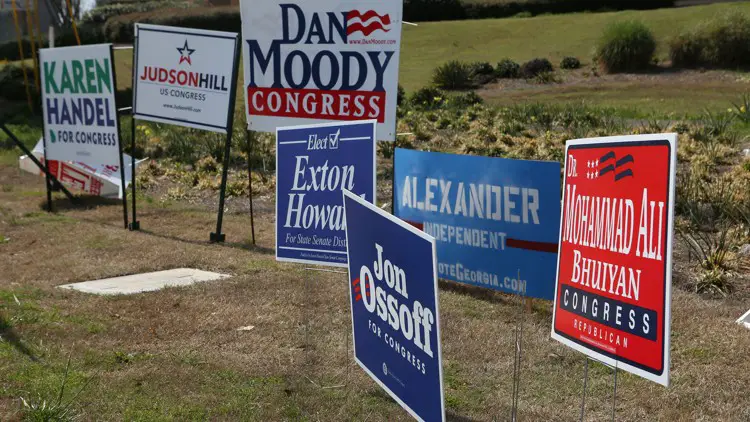We have another special election tomorrow, and the spinmeisters have been hard at work all weekend. Is a special election in Georgia really going to tell us what will happen in 2018? All of the special elections this year are “safe” Republican districts. Otherwise, Trump would not have named the sitting congressman to his administration. So it’s not about who wins, it’s about how strongly a candidate wins. It’s about comparing with the norm.
We covered this in these pages in our February preview.
Georgia 6
• Election date: April 18 primary, June 20 general election
• 2016 presidential margin: Trump 48 percent, Clinton 47 percent
• 2016 House margin: Tom Price (Republican) 62 percent, Rodney Stooksbury (Democrat) 38 percentIf there is one special election to watch, it’s this one in the Atlanta suburbs. Republican Tom Price (now Trump’s secretary of health and human services) easily won this district in 2016. But Trump barely carried it in the 2016 general election and lost it in the Georgia GOP primary to Marco Rubio (despite carrying the state going away). Trump struggled largely because the district is highly educated — 60 percent of people 25 or older in the district have a college degree, compared with just 31 percent nationally. Mitt Romney won this district by over 20 percentage points in 2012, but Trump underperformed across the country with college-educated voters compared to previous Republican nominees. . .
In this case, Tom Price won by a 2-1 margin. If the GOP win is significantly less than that, it might reflect anger, or at least disappointment, among the faithful.
The National Journal says the election is going right down to the wire.
Republicans are nervously anticipating Tuesday’s congressional election in Georgia, furiously trying to prevent Democrat Ossoff from winning a majority of the vote in a suburban Atlantic district that hasn’t elected a Democrat since Jimmy Carter’s presidency. The late flurry of spending from outside GOP gropus has stunted Ossoff’s momentum, but the unpredictability of turnout in an off-year race and the possibility for some Republicans to defect are keeping party officials up at night.
The encouraging news for the GOP: A flurry of registered Republicans have showed up to cast early ballots in the past several days, closing the partisan gap that emerged early on. The New York Times’ Nate Cohn reported that, as of Thursday night, there’s a fairly even partisan split among early votes: Registered Democrats have cast 42 percent of preelection ballots and registered Republicans hav cast 41 percent. Republicans are still seriously underperforming in the early vote, but not at a low-enough level to give Ossoff an outright victory [50%].
The bad news for the GOP: Under normal circumstances, Ossoff shouldn’t be coming close to winning a majority of the vote in a conservatively friendly district like this.
The election is close enough that House Speaker Ryan has become involved, according to NewsMax.
Whether sensing danger or just not taking any chances, House Speaker Paul Ryan is throwing his weight into the Georgia congressional race. . . Without endorsing a particular GOP candidate, Ryan recorded a general “get out the vote” robocall to Republican voters in Georgia’s 6th district.
Breitbart notes that no one is expected to “win” tomorrow. That is, it would take 50% of the vote to win, and there are 18 candidates, including eleven Republicans. So the seat will be contested again, in June.
. . . most observers expect Republican voters to rally around whichever Republican qualifies for the two person runoff if Democrat Ossof is the other to make the cut on April 18. . . The top two vote-getters in the April 18 special election are headed to a likely June 20 runoff.
So we won’t know who “wins” until June, and the Daily Caller says things are looking good for the GOP, according to polls.
Republicans are gaining ground in the special election to replace Georgia Rep. Tom Price, according to a new poll published Monday by a local Fox affiliate.
Democratic candidate Jon Ossoff still leads in the 18-candidate field, but Republican former Georgia Secretary of State Karen Handel is now in a close second. Handel earned 41 percent, compared to Ossoff’s 42.4 percent. . .
Ossoff enjoyed nearly a 6 point lead against Handel in a February poll, spurring Democratic optimism that they could take the strong Republican seat, but significant ad spending by Republican groups over the past month resulted in a much closer race, according to the poll.
Breitbart notes that Democrat Ossoff does not live in the district he’s running for, but noted that, legally, one only need to live in the State.
According to the Constitution, you only need to be a resident of the state to represent any district in that state. Still, tradition and common sense has made it a virtual requirement to reside in the district which you represent, that is, until the rise of the nationalized local election.
Meanwhile, former presidential primary candidate Bernie Sanders has hit the road to campaign for Democrats.
Sanders is about to embark on a nine-state tour with new Democratic National Committee Chairman Tom Perez, focusing on red states.
“So many of our people are giving up on the political process. It is very frightening. In the last presidential election, when Trump won, we had the lowest voter turnout over — in 20 years. And in the previous two years before that, in the midterm election, we had the lowest voter turnout in 70 years,” Sanders said. “We’re going to be fighting to see that the Democratic Party becomes a 50-state party. You can’t just be a West Coast party and an East Coast party.”
The bottom line about Georgia’s special election is that it will probably mean—nothing. None of the 18 candidates are expected to win 50% of the vote, so we will go to a massive campaign leading to the June 20 vote. That’s the one that matters.
